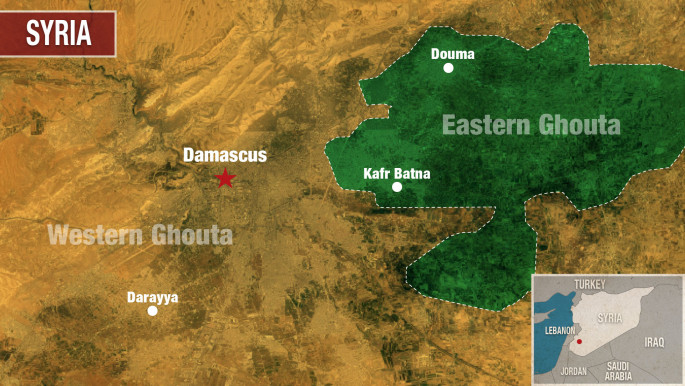Food shortage forces Syrians to eat rubbish and animal refuse in Eastern Ghouta
The report found that nearly 174,500 people trapped in the town of Douma since September have been forced to adopt emergency 'coping strategies'.
These coping strategies include consuming expired food, animal fodder and refuse, going days without eating and begging and engaging in high risk activities to get food. There have been numerous reports of hunger-induced fainting episodes among school children and teachers.
More than four people have died from hunger, including a child in Douma who took his own life.
Eastern Ghouta has been under siege by the Syrian regime forces since 2013, and no food aid convoys have entered Douma since wheat flour rations in August.
WFP expects the situation to further deteriorate in the coming weeks when the current food stock is expected to be depleted completely, eroding the current household coping strategies.
 |
My daughter cries every time I lock her door because she knows today is not her turn and will sleep with an empty stomach |  |
 |
|
"Some households are even resorting to rotation strategies whereby the children who ate yesterday would not eat today and vice-versa."
In one example, a mother explains how she’s forced to rotate rations between her 13-year-old daughter and her two and three-year-old orphaned grandchildren.
"My daughter cries every time I lock her door because she knows today is not her turn and will sleep with an empty stomach," she said.
Restrictions placed mean that the WFP is only able to provide a fraction of the food required.
The World Health Organisation has also expressed 'grave' concerns over the deteriorating situation in Eastern Ghouta with the needs of up to 400,000 people besieged not met.
The statements come at a time when the United Nations revealed that more than 13 million Syrians are in need of aid.
The Syrian conflict began when the Baath regime, in power since 1963 and led by Assad, responded with military force to peaceful protests demanding democratic reforms during the Arab Spring wave of uprisings, triggering an armed rebellion fuelled by mass defections from the Syrian army.
The brutal tactics pursued mainly by the regime, which have included the use of chemical weapons, sieges, mass executions and torture against civilians have led to war crimes investigations.
![Ghouta strikes [Getty] Ghouta strikes [Getty]](/sites/default/files/styles/large_16_9/public/media/images/BC5EABEC-82FE-4914-9B93-4797937E19DE.jpg?h=d1cb525d&itok=eQErbkjy)


